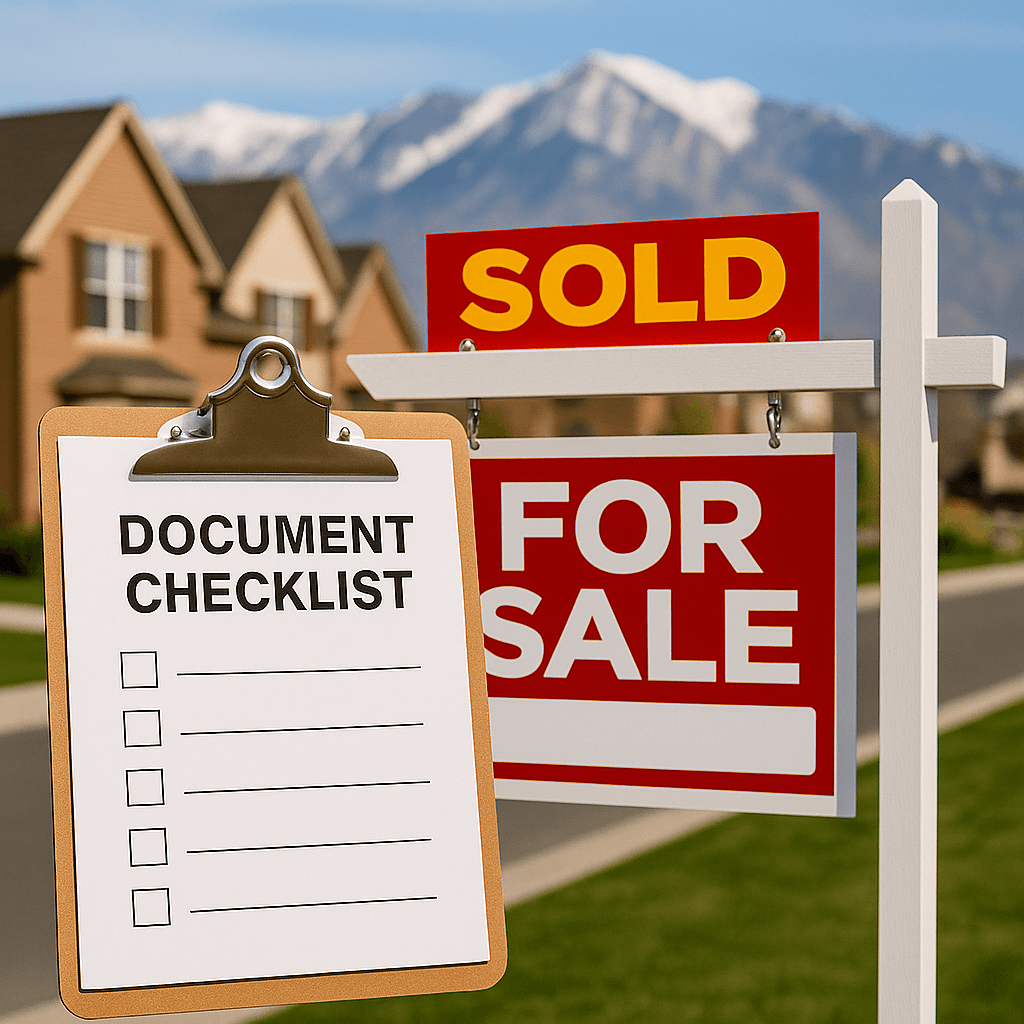What Paperwork Is Required to Sell a Home in Salt Lake County? Mark Haaga Explains
What paperwork do you actually need to sell your home in Salt Lake County — and what does it all mean?
If you’re selling a home in Salt Lake County, you're going to encounter a lot of paperwork. But instead of handing you a legal checklist with no context, we’re walking you through exactly what you'll sign, when you’ll sign it, and why it matters.
This is the real-world paperwork journey — explained by the Mark Haaga Real Estate Team.
📄 Before You List: Pre-Listing Documents
✅ 1. Listing Agreement
This is the first official document you'll sign. It gives your real estate agent permission to list and market your home.
- Commission details
- Timeframe the agreement is valid
- What services the agent will provide
🛠 Mark’s Team Tip: We walk you through this line by line before listing — no surprises.
✅ 2. Seller Property Condition Disclosures (SPCD)
Utah’s standard real estate purchase process requires sellers to disclose known material defects — and this is usually done through the Seller Property Condition Disclosure (SPCD) form.
While this form isn’t directly mandated by statute, it’s a critical part of the transaction and referenced in
Section 7 of the Utah Real Estate Purchase Contract (REPC), which states that the seller agrees to disclose known defects in writing. Most agents use the standardized SPCD form to satisfy this requirement.
- Why it matters:
- Hiding problems can kill a sale later (or worse, lead to lawsuits)
- A well-completed disclosure builds buyer trust
📌 If your home was built before 1978, you’ll also sign a Lead-Based Paint Disclosure.
🧾 During the Sale: Offer & Contract Phase
✅ 3. Real Estate Purchase Contract (REPC)
Once you get an offer, you’ll review and negotiate a Real Estate Purchase Contract (REPC) — Utah’s standardized contract used in most residential sales. This is the legal backbone of the transaction, and it covers the major terms of your sale.
- Purchase price & earnest money deposit
- Requested closing date
- Contingencies (financing, inspection, appraisal, etc.)
- Items included (appliances, hot tub, etc.)
💡 Mark’s Team walks you through every offer and interprets what each term really means for you. From earnest money to appraisal gaps, we help you understand how it affects your bottom line — and we negotiate strategically on your behalf. Our goal is not just to get the home sold, but to protect your equity and your timeline.
✅ 4. Counter Offer Forms & Contract Amendments
Don’t like an offer? Your agent will help you complete a Counter Offer form — a formal way to change terms like price, closing date, or requested repairs without voiding the original offer.
Important: All Utah real estate offers and counteroffers must be in writing — verbal agreements don’t hold up.
💡 This is where negotiation gets real. Mark’s Team not only helps you structure an effective counter, but we also help you understand the likely buyer response. We aim to keep your deal alive while protecting your bottom line. Timing, tone, and legal accuracy all matter — and that’s where we go to work for you.
If anything in the transaction changes — like extending a closing date, agreed-upon repairs, or financing terms — those updates are documented in Addenda or Amendments to the original contract. These documents are legally binding and part of your final file.
📌 Mark’s Team helps ensure all changes are captured in writing so nothing falls through the cracks before closing.
🖊 Final Stage: Closing Day Documents
✅ 7. Final Closing Documents
Closing day is when the transaction becomes official — and there's a stack of paperwork to prove it. Here’s what to expect:
What Happens on Closing Day:
- You’ll meet at the title or escrow office (or sign remotely, depending on circumstances).
- You’ll review and sign all required legal documents.
- The buyer transfers funds, and the title company disburses them to you.
- The property deed is recorded with Salt Lake County.
Key Closing Documents Include:
- Closing Disclosure or ALTA Settlement Statement: A detailed breakdown of costs and payouts (down to the last penny).
- Warranty Deed (or Special Warranty Deed): This document officially transfers ownership from you to the buyer.
- Affidavit of Property Value: May be required for tax reporting depending on local rules.
📌 Want a closer look at the full closing process? Visit
FNTIC Utah – What to Expect at Closing.
🛡 Mark’s Team prepares you ahead of time so you know what to expect — no surprises, no delays.
📎 Optional Documents (Depending on Your Property)
- HOA Documents: Rules, dues, CC&Rs
- Home Warranty Transfer (if included in sale)
- Receipts for repairs or upgrades
- Well or septic disclosures (if applicable)
Final Thoughts: Simplifying the Paper Trail
Selling your home comes with a surprising amount of paperwork — contracts, disclosures, legal language, timelines. And while it can feel overwhelming, you’re not meant to navigate it alone.
The Mark Haaga Real Estate Team doesn’t just push papers. We’re here to explain every step, every signature, and every decision. More importantly, we’re here to protect your interests, reduce your risk, and negotiate in your favor when it matters most.
We combine years of local experience with a deep understanding of Utah’s real estate process — not just to help you close, but to help you close with confidence.
Selling soon? Let’s talk — we’ll guide you through every step.

